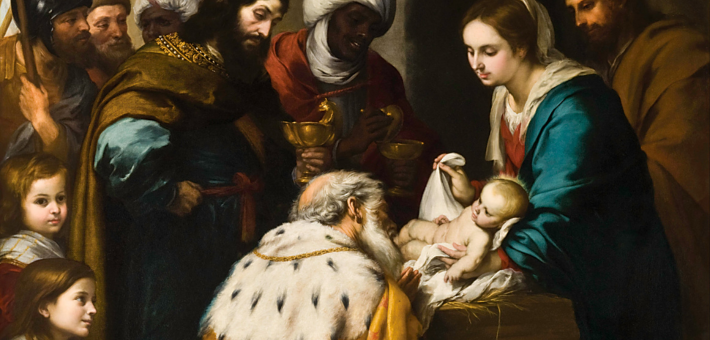Commentary on Matthew 2:1-12
For Epiphany the lectionary offers us a tale of two kings: the holy child Jesus and the godless Herod.
Hemmed in by Herod’s menace and flanked by holy dreams from God, the passage is also a tale of two cities: Bethlehem, city of David, introduced in 2:1 as the birthplace of Jesus, whom we already know to be the Christ, child of the Holy Spirit, Savior, and Emmanuel; and Jerusalem, also a holy city of prophecy (Isaiah 65:17–25; Revelation 21:1–22:5), but now the royal city of Herod and the place where Jesus will die.
But first, behold, magi! “Behold” or “look” (not present in all translations) signals something important—a star (2:9), angels (1:20; 2:13, 19), a holy birth (1:23), and, here, surprising visitors from the East, some combination of astrologers, philosophers, magicians, religious advisors, courtiers, intellectuals of prestige and wealth, but not kings and not three. We cannot say how many there are. In some traditions they become 12. Others assign them names and ages. What we can be sure of is that they are Gentiles not from these parts, that the light of glory has shone beyond Jesus’ own country to draw the world to his saving grace, as the other lectionary texts for the day also suggest.
These surprising Gentile visitors will move the passage from Jerusalem to Bethlehem and then will follow a dream in order to save the Christ, but not before they strike fear in the heart of Herod.
The magi give the holy child another title, king of the Jews, another nod toward what is to come in Jerusalem, city that kills the prophets but which Jesus still regards with mothering love (23:37). The title will not appear again until the passion narrative, as the charge against Jesus that will be written above his head on the cross.
The magi have seen his star and, even more alarming to Herod, have come to pay him homage. This verb refers to a physical display of reverence for royalty or a god. In Matthew, this is directed almost always to Jesus by those who need him, follow him, and recognize him as the risen Lord. The devil will request this homage in vain from Jesus in the wilderness in return for all the kingdoms of the world.
When Herod hears about a baby king already attracting the reverence of foreign elites with cosmic signs, he is frightened. Indeed, all Jerusalem is frightened at the prospect of a competing king to trouble (another translation of this verb) ruthless Herod. A troubled Herod is a dangerous Herod.
By contrast, Jesus, troubled when he sees Mary of Bethany weeping, raises her brother Lazarus from the dead. Jesus, troubled when he realizes he will soon die, embraces the hour for the glory of God. Jesus, troubled that one of his own is about to betray him, comforts his friends and promises them infinite joy to come, and the presence of the Spirit to guide them. That is where a troubled spirit leads Jesus. A troubled Herod is moved to cunning and violence.
Herod calls in the chief priests, who are his own appointed religious elites, and the scribes, who will be complicit in Jesus’ suffering and death (16:21) and whom, along with the Pharisees, Jesus condemns at length in an excoriating critique of their hypocrisy and corruption (23:2–36). With a combination of Micah 5:2 and 2 Samuel 5:2, they point Herod to Bethlehem, and he directs the magi to go and then come back with news, which clearly does not bode well.
The magi have followed the logic of the kingdoms of this world to the place where they expect a royal birth, Jerusalem. But as soon as they turn toward the city of David, behold! The star they have seen in their distant homeland leads them to the holy child and his mother (not in temporary accommodation with a manger, but in a house—as there is no star in Luke, there is no census here).
The overwhelming joy of the magi, which contrasts starkly with the terror of Herod and his subjects, suggests that they feel themselves in the presence not only of a king but of a savior. They have toted their treasures to a royal palace, but the cosmic sign has led them instead to the kingdom of heaven, where treasures are best placed (6:19–21; 13:44).
As the visitors have captured the imagination of theologians, poets, musicians, and artists for centuries, so have their gifts, which have been interpreted symbolically, theologically, artistically, richly in ways the text does not support, but which its openness and evocativeness have invited. What we can say without doubt is that frankincense and myrrh are costly, imported items, which, like gold, are suitable for even the wealthiest giver and noblest recipient. The magi are, most of all, models of faithfully following signs to the holy and laying our treasures there, then heeding the God of holy dreams, even if it means disobeying a king and taking the long way home.
Herod is left infuriated. His response in the second half of the story (2:13–18) is cruel. Children are murdered. The Christ and his parents flee by night to become political refugees in Egypt. Even then, the family of Herod is not finished. His son’s presence ruling over Judea will lead the holy family to Nazareth, and another violent son will murder John the Baptist to please a dancing girl. Then, later, another ruthless ruler, ignoring a warning in his wife’s dream, will kill Jesus at the behest of other religious professionals.
But none of them achieve their ultimate aim because, although the Herods of this world think every story is theirs, they are never the real king, and the kingdom of the One guiding the holy family and the faithful magi transcends all the kingdoms of the earth and does not follow their rules.
The Gospel will end with life. And behold, God-with-us always.
And still the story continues, with people worshiping and protecting the vulnerable Christ—present still in the stranger, the prisoner, the hungry (25:31–40)—and following holy dreams of God a long way in wisdom and love.


January 6, 2025